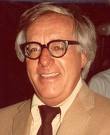Mystery Books
Mystery Movies
Mystery Authors
Ray Bradbury biography
Ray Bradbury is one of the immortals among us, whose classic works of SF, fantasy and horror will be read a thousand years from now by our descendents and the inhabitants of the planets of a thousand distant stars.
Ray is a winner of the Nebula, Prometheus, O.Henry Memorial, Balrog, Bram Stoker, Benjamin Franklin, Aviation-Space Writers and World Fantasy (Lifetime Achievement) Awards. It's surely redundant to say he's a SFWA Grand Master. He has won the Gandalf Award for Lifetime Contribution to Fantasy (in 1980), and published his first story in 1941. A writer for TV, radio, theater and film, his credits including a script for the film Moby Dick. His show The Ray Bradbury Theatre is currently showing on the Sci-Fi Channel. Mel Gibson will star in and direct a new remake of Ray's classic Fahrenheit 451, slated for release in 1999.
Ray Bradbury is one of the immortals among us, whose classic works of SF, fantasy and horror will be read a thousand years from now by our descendents and the inhabitants of the planets of a thousand distant stars.
Ray is a winner of the Nebula, Prometheus, O.Henry Memorial, Balrog, Bram Stoker, Benjamin Franklin, Aviation-Space Writers and World Fantasy (Lifetime Achievement) Awards. It's surely redundant to say he's a SFWA Grand Master. He has won the Gandalf Award for Lifetime Contribution to Fantasy (in 1980), and published his first story in 1941. A writer for TV, radio, theater and film, his credits including a script for the film Moby Dick. His show The Ray Bradbury Theatre is currently showing on the Sci-Fi Channel. Mel Gibson will star in and direct a new remake of Ray's classic Fahrenheit 451, slated for release in 1999.
Ray's fiction comes in both heavy-duty novel-length parcels and the handy, travel-size short-story package for ease and convenience, and his work is brilliant in both forms. His novels include Fahrenheit 451 (Locus Award, 1987; Prometheus Award, 1984), The Halloween Tree, Death is a Lonely Business, Something Wicked This Way Comes (Locus Award, 1987), A Graveyard for Lunatics, Green Shadows and White Whale. His short-fiction has been collected or included in nearly uncountable anthologies and collections, including Dark Carnival, The Silver Locusts, Timeless Stories for Today and Tomorrow, The Golden Apples of the Sun, The October Country, Dandelion Wine, A Medicine for Melancholy, The Day It Rained Forever, R Is for Rocket, The Small Assassin, The Anthem Sprinters and Other Antics, The Machineries of Joy, The Autumn People, S Is for Space, Tomorrow Midnight, Twice 22, The Vintage Bradbury, I Sing the Body Electric, The Wonderful Ice Cream Suit and Other Plays, When Elephants Last in the Dooryard Bloomed, Pillar of Fire and Other Plays, Long After Midnight, Beyond 1984: A Remembrance of Things Future, The Haunted Computer and the Android Pope, The Complete Poems of Ray Bradbury, Fahrenheit 451, The Stories of Ray Bradbury Volume 2 and The Stories of Ray Bradbury (Locus Award, 1981).
Bradbury's stories and novels have been adapted for the screen, both large and small. The Martian Chronicles (1980 miniseries), Vino iz oduvanchikov (1996 miniseries), Any Friend of Nicholas Nickleby Is a Friend of Mine (1981 TV), The Beast From 20,000 Fathoms (1953), Fahrenheit 451 (1966), The Illustrated Man (1969), It Came From Outer Space (1953), It Came From Outer Space II (1996), King of Kings (1961), Moby Dick (1956), The Murderer (1976), The Picasso Summer (1969), Quest (1983), Something Wicked This Way Comes (1983), and Trinadtsaty apostol (1988).
He was born in Waukegan, Illinois on August 22, 1920. He lived in Illinois until about 1933-34, when his family headed out to live in Los Angeles, but first lived very shortly in Tucson, Arizona. He graduated from Los Angeles High School in 1938, then spent most of his time at the library, where (according to Ray) he graduated from the library at the age of 28. He and his family still live in Los Angeles, California.
Information source: wikipedia